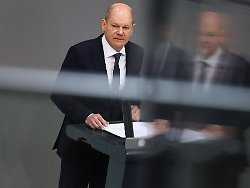Discussion about NATO target
How about the two percent?
03/23/2022 9:52 p.m
With the planned special fund, Germany will achieve NATO’s two percent target. But what if the money is gone? And didn’t Scholz say otherwise in his government statement?
Even if the planned special fund of over 100 billion euros could rain down money on the Bundeswehr, a well-known topic still has what it takes to become a long-running debate: NATO’s two percent target. At two summits (2002 and 2014), the members of the North Atlantic Defense Alliance pledged to spend at least two percent of gross domestic product (GDP) on defense. Thanks to the aforementioned special fund, Germany will achieve this goal in the coming years. And yet it continues to be talked about.
Because Chancellor Olaf Scholz had in his “Turning in time” government declaration on February 27th didn’t you promise something else? Many of his listeners understood him to mean that Germany would get the special fund and, on top of that, would spend more than two percent of GDP on defense. CDU faction leader Friederich Merz alluded to this in the budget debate in the Bundestag.
Merz said that Scholz gave exactly this impression almost four weeks ago. What he acknowledged with a shake of the head – and was right. Scholz had said the following: “The 2022 federal budget will provide this special fund with a one-off amount of 100 billion euros. We will use the funds for necessary investments and armaments projects. From now on we will invest more than two percent of gross domestic product in our defense every year.”
Does the two percent target remain?
He apparently meant that this would be possible through the special fund. Because otherwise it would mean that the defense budget would have to increase from around 50 billion euros at present to around 70 billion euros in order to reach around two percent of GDP. That would add up to another 100 billion euros in just five years. It is plausible that Scholz did not want to announce exactly that, even if it sounded that way to some ears.
Merz also pointed out that the special fund should be used up in five years and demanded that Germany should continue to provide at least two percent for its military afterwards. His party friend Karin Vieregge went even further. She, too, understood Scholz at the end of February that the special fund should come and that the two percent target should also be achieved. That’s exactly what she advocated. “That would really be a clear signal.”
As in the election campaign last year, Foreign Minister Annalena Baerbock questioned the two percent target in her speech. It depends on the actual capabilities of the Bundeswehr, said the Greens politician, pointing out that the two percent would drop as soon as GDP fell. The debate should therefore continue.
